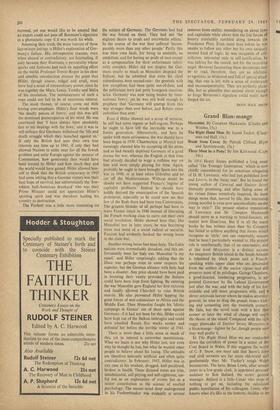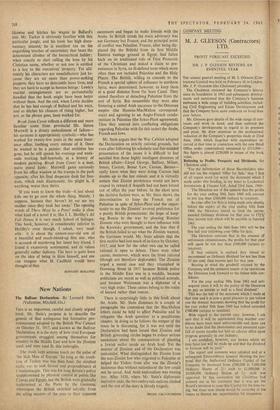Grand Blanc mange
IN 1914 Henry James published a long essay called 'The Younger Generation,' which is now chiefly remembered for its notorious relegating of D. H. Lawrence, who had just published Sons and Lovers, to the 'dusty rear.' But he found the young author of Carnival and Sinister Street distinctly promising, and after listing some of his virtues James tentatively inquired, 'do these things mean that; moved by life, this interesting young novelist is even now uncontrollably on the way to style?' The present relative reputations of Lawrence and Sir Compton Mackenzie should serve as a warning to trend-fanciers, no matter how illustrious. But if in all the many books he has written since then Sir Compton has failed to achieve anything that James would recognise as 'style,' one can reasonably assume that he hasn't particularly wanted to. His present role is unashamedly that of an entertainer, and at this level Mezzotint is a • distinct success. An imaginary British island in the South Atlantic is inhabited by black peons and a French- speaking white upper class who are descended from the settlers of the ancien regime and still preserve most of its privileges. George Clapshaw, a good-hearted, lumbering progressive, is ap- pointed Governor by the Labour Government just after the war, and with the help of his for- midable and still more progressive wife, and a clever octoroon lawyer whom he makes attorney- general, he tries to drag the Brands blancs kick- ing and screaming into the twentieth century. He fails, but the novel ends with a hint that sooner or later the wind of change will regh the shores of the island. Compared with the rich soggy plumcake of Sinister Street, Mezzotint is a blancmange—lighter by far, though people now may well prefer it.
In The Right Hand Man we are conducted down the corridors of power in a sector of the Coal Board in Wales. If this suggests the world of C. P. Snow, one must add that Snow's dons and civil servants are far more old-world and gentlemanly than Mr. Tucker's tough W4511 bureaucrats. The hero, Brian Lewis, after several years as a low-grade clerk, is appointed personal assistant to Bob Ballard, the sector general manager. Ballard is a little Cesar who stops at nothing to get on, including the calculated public humiliation of his colleagues. Lewis, who knows what it's like at the bottom, decides to do likewise and hitches his wagon to Ballard's star. Mr. Tucker is obviously familiar with this particular jungle, and his book has high docu- mentary interest; he is excellent too on the anguishing touches of uncertainty that beset the determined climber of the hierarchical ladder: when exactly to start calling the boss by his Christian name, whether or not one is entitled to a key to the executives' lavatory. Yet ulti- mately his characters are unsatisfactory just be- cause they are no more than power-seeking puppets; they have no detectable inner lives, and they are hard to accept as human beings : Lewis's marital entanglements are so perfunctorily handled that the book might have been better without them. And the end, when Lewis decides that he has had enough of Ballard and his ways, and so ditches his chances of rising higher, has not, as the phrase goes, been worked for.
Break from Cover reflects a different and more familiar scene from provincial life. Simon Mortwill is a dreary embodiment of failure— his surname is appropriately symbolic—who has worked for twenty-five years in the same insur- ance office, loathing every minute of it. Once he wanted to be a painter; that ambition has gone, but he still spends his evenings and week- ends working half-heartedly at a history of modern painting. Break from Cover is a neat, naive moral fable : Mortwill gazes enviously from his office window at the tramps in the park opposite; after his final desperate dash for free- dom, which ends disastrously, his plight is, if anything, worse than theirs.
`If you want to know the truth—it just about kills me to go over the whole thing. Mainly, I suppose, because they haven't let me see my mother since they took her away.' The opening words of There Must be a Pony! make it clear what kind of a novel it is; like J. L. Herlihy's All Fall Down, it is very much School of Winger. This book, however, is considerably inferior to Herlihy's even though, I admit, very read- able : it is about the sixteen-year-old son of a beautiful and much-mixed-up film star, who is accused of murdering her latest boy friend. I found it excessively sentimental, and its values generally rather dubious. The hero is quite keen on the idea of being in films himself, and one can imagine what H. Caulfield would have thought of that.
BERNARD BERGONZI







































 Previous page
Previous page